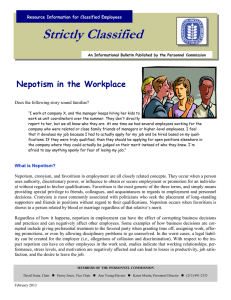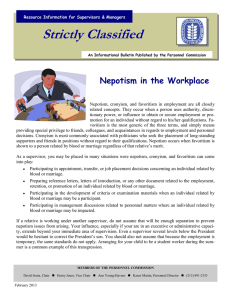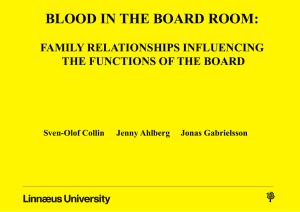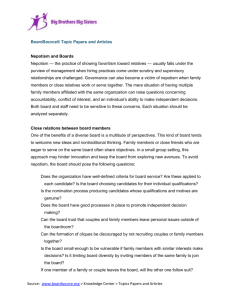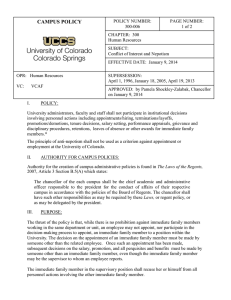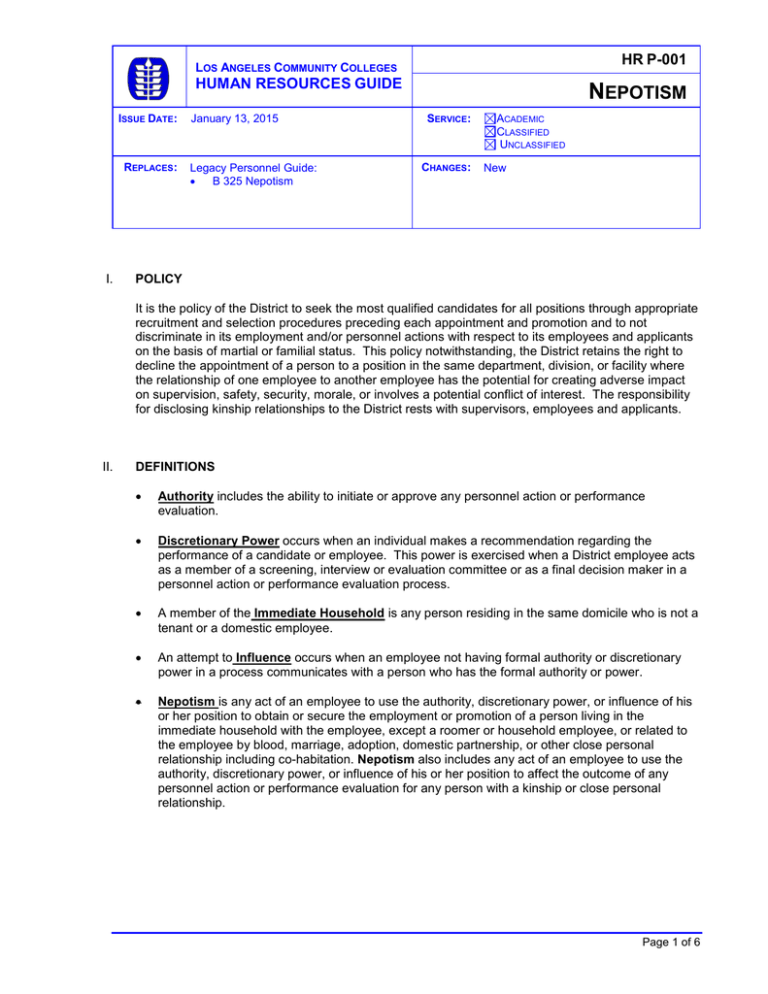
HR P-001
LOS ANGELES COMMUNITY COLLEGES
HUMAN RESOURCES GUIDE
ISSUE DATE:
REPLACES:
I.
January 13, 2015
Legacy Personnel Guide:
•
B 325 Nepotism
NEPOTISM
SERVICE:
CHANGES:
ACADEMIC
CLASSIFIED
UNCLASSIFIED
New
POLICY
It is the policy of the District to seek the most qualified candidates for all positions through appropriate
recruitment and selection procedures preceding each appointment and promotion and to not
discriminate in its employment and/or personnel actions with respect to its employees and applicants
on the basis of martial or familial status. This policy notwithstanding, the District retains the right to
decline the appointment of a person to a position in the same department, division, or facility where
the relationship of one employee to another employee has the potential for creating adverse impact
on supervision, safety, security, morale, or involves a potential conflict of interest. The responsibility
for disclosing kinship relationships to the District rests with supervisors, employees and applicants.
II.
DEFINITIONS
•
Authority includes the ability to initiate or approve any personnel action or performance
evaluation.
•
Discretionary Power occurs when an individual makes a recommendation regarding the
performance of a candidate or employee. This power is exercised when a District employee acts
as a member of a screening, interview or evaluation committee or as a final decision maker in a
personnel action or performance evaluation process.
•
A member of the Immediate Household is any person residing in the same domicile who is not a
tenant or a domestic employee.
•
An attempt to Influence occurs when an employee not having formal authority or discretionary
power in a process communicates with a person who has the formal authority or power.
•
Nepotism is any act of an employee to use the authority, discretionary power, or influence of his
or her position to obtain or secure the employment or promotion of a person living in the
immediate household with the employee, except a roomer or household employee, or related to
the employee by blood, marriage, adoption, domestic partnership, or other close personal
relationship including co-habitation. Nepotism also includes any act of an employee to use the
authority, discretionary power, or influence of his or her position to affect the outcome of any
personnel action or performance evaluation for any person with a kinship or close personal
relationship.
Page 1 of 6
LOS ANGELES COMMUNITY COLLEGES
HUMAN RESOURCES GUIDE
III.
HR P-001
NEPOTISM
REQUIREMENTS
A.
Applicability: For purposes of this policy, a “relative” or “close personal relationship” or “kinship
relationship” includes:
1. A person related by blood or marriage shall include mother, father, daughter, son,
grandmother, grandfather, granddaughter, grandson, brother, sister, aunt, uncle, niece and
nephew; husband and wife; spouse of a daughter, son, brother, sister, aunt, uncle, niece and
nephew; stepmother, stepfather, stepdaughter, stepson, stepbrother, stepsister, and spouse
of a stepdaughter, stepson, stepbrother and stepsister; a mother, father, son, daughter,
brother and sister relationship by adoption; domestic partner; and, any other relative living in
the immediate household of an employee.
2. Relatives of domestic partners shall be treated as relatives of spouses.
3. Persons living together in conjugal relationships, even though not legally married or
registered as domestic partners, shall be considered “a close personal relationship.”
B. General Principles
1. Employees are always to be hired based on knowledge, skills, abilities and experience.
When an individual interested in employment with the District has a kinship or closed
personal relationship with an employee of the District, the individual interested in employment
is required to apply through standard selection processes.
2. No District or college employee or officer shall engage in any activity that creates a conflict of
interest between their official duties and any other interest or obligation. Conflict of interest
requires all employees and offers to disclose the conflict of interest and disqualify themselves
from participating in a decision when a financial or personal interest is present.
3. The following conditions do not serve as a basis to waive restrictions of this policy:
•
•
•
Source of Funding
Employee Service (academic, classified, or unclassified)
Employment Status (temporary, permanent, part-time, full-time, contractual)
4. Conformity with this policy requires supervisors and applicants to identify kinship or close
personal relationships, and to ensure that employees with such relationships recuse
themselves from participating in selection or promotional processes when the candidate for
employment or promotion is a relative or has a close personal relationship.
5. Policy Violations: The Employer-Employee Relations Unit and the Office of General
Counsel are available to assist administrators in determining whether a violation of the
nepotism policy has occurred and with how best to address policy violations in a fair,
equitable and consistent manner.
6. Potential Compliance Claims: Individuals should be aware that a consensual personal
relationship of a sexual or romantic nature can result in a sexual harassment claim because
voluntary consent may be questioned when a power differential exists between individuals in
the relationship or when the relationship ends. If a sexual harassment claim is subsequently
filed by one of the individuals in the relationship, the argument that the relationship was
consensual is evaluated in the light of the power differential. See Board Rule Chapter XV,
Prohibited Discrimination and Harassment, for the District’s policy.
January 13, 2015
Page 2 of 6
LOS ANGELES COMMUNITY COLLEGES
HUMAN RESOURCES GUIDE
HR P-001
NEPOTISM
C. Prohibited Activities: In order to ensure employment decisions are free from conflicts of
interest, reflect uncompromised objective judgment, facilitate the integrity of the District’s work
environment, do not adversely impact morale, and uphold the principles associated with working
in the public not personal interest, employees as defined in Section III. A, Applicability, above, are
prohibited from participating in any activity that includes, but is not necessarily limited to the
following processes:
1. Preparing reference forms, appraisals of promotability, letters of reference, performance
evaluations or any other evaluation process document related to the employment, retention,
promotion, or approval of personnel actions.
2. Preparing employment criteria, examination materials, interview questions, or participating
directly or indirectly in the screening or interviewing of candidates for employment or
promotion.
3. Participating in evaluation or personnel action decisions.
4. Determining salary or salary placement.
5. Initiating or approving a personnel action in the district’s computer system.
6. Participating in or influencing a selection process or a reporting relationship where:
a. One person would exercise authority, discretionary power, or influence regarding the
working conditions, work assignment, evaluation of work, discipline, retention, promotion,
or change of status of the other person.
b. Both persons would be assigned to the same department and/or under the same
immediate supervisor.
7. Giving instructions and/or directives, evaluating performance, correcting behavior.
Supervision can be direct or can be exercised indirectly through a “chain of command” of
intermediate supervisors with the expectation that subordinate employees will carry out the
instruction or directive.
D. Compliance
1. Compliance with the District’s nepotism policy is achieved by structuring the conditions of
employment and the association of related parties to avoid or eliminate prohibited activities or
to avoid the relationship that leads to prohibited activities.
2. Consultation: Members of the District community who are in personal relationships with
each other and who are likely to be placed in positions that influence the employment of their
relatives as defined above, must consult with the appropriate administrator to seek guidance
about eliminating and avoiding existing and potential conflicts arising from the relationships.
The purpose of the consultation is to ensure that:
a. Arrangements are made to eliminate and avoid conflicts of interest and compromised
objective judgment.
b. The individuals involved do not hire, promote, supervise, evaluate, determine salary,
grade, advise, or otherwise directly influence each other’s employment.
January 13, 2015
Page 3 of 6
LOS ANGELES COMMUNITY COLLEGES
HUMAN RESOURCES GUIDE
c.
HR P-001
NEPOTISM
The arrangements made to eliminate and avoid conflicts of interest do not unreasonably
disadvantage either party, particularly a subordinate in the employment association.
d. The arrangements are disclosed as necessary and appropriate to the administrators who
need to know about them in order to implement the District’s nepotism policy and, if
appropriate, to structure the adjustments described below.
3. Structuring employment or association must be done in consultation with an appropriate
administrator and in a manner that provides safeguards designed to ensure decisions made
by or about either of the parties are made impartially.
a. Under this policy, an appropriate administrator is defined as a supervisor, department
head, supervising administrator, College President or Educational Services Center (ESC)
equivalent, Employer-Employee-Relations representative, or compliance officer.
b. Structuring of employment responsibilities must be done after appropriate consultation
and must not unreasonably disadvantage either District employee.
c.
When a power disparity exists in the employment of the individuals involved in the
personal relationship, the employment interests of the subordinate must be protected
when structuring the association to avoid the prohibited activities described above.
d. The administrator consulted pursuant to this policy shall take the following steps in a
timely manner:
i.
Discuss with each individual in the relationship the employment relationship,
existing and potential conflicts of interest, and the steps to be taken to eliminate
and avoid compromised objective judgment.
ii.
Document the steps to be taken to eliminate and avoid compromised objective
judgment and existing or potential conflicts of interest.
iii.
Protect the privacy of the individuals involved and, if appropriate, the security of
the documentation created during the consultation.
4. Exclusion or Exception to Nepotism Policy: An exclusion or exception to the nepotism
policy described in prohibited activities may be granted under the conditions listed below. If
an exclusion exception is granted, safeguards must be implemented to help ensure that any
employment decision regarding the involved individuals is made impartially.
a. An exclusion to one or more prohibited activities may be granted when eliminating the
prohibited activity would unreasonably disadvantage one or both of the individuals
involved in a personal relationship.
b. An exception may be permitted to the above requirements if all of the following
conditions are met:
January 13, 2015
i.
The person is determined to be eligible for appointment following customary
selection procedures for the position.
ii.
A comparable assignment in another department cannot be offered to the
individual.
Page 4 of 6
LOS ANGELES COMMUNITY COLLEGES
HUMAN RESOURCES GUIDE
c.
HR P-001
NEPOTISM
iii.
The person is determined to be an appropriate candidate for the position by the
College President or the Vice Chancellor for Human Resources.
iv.
The candidacy of the person is determined to be in the best interest of the District
by the Vice Chancellor for Human Resources.
If an exclusion or exception to the prohibited activities is made, the following actions shall
be taken.
i.
When an employee having authority or discretionary power in a personnel action
becomes aware of the candidacy of a relative or a person living in their
household, they shall refrain from engaging or participating in any of the
recruitment, selection, evaluation, or personnel action processes. A substitute
should be obtained to perform the duties that would normally be considered a
nepotistic conflict whenever possible.
ii.
As soon as a vacancy occurs anywhere in the district for the job affected, the
employee shall be notified of the opportunity to be voluntarily transferred or
reassigned to the vacancy. Such employee shall be allowed up to five working
days to decide whether he or she will accept transfer or reassignment to the
vacancy. If the employee should refuse the voluntary transfer or reassignment
to the vacancy and that employee was regularly employed in the District for a
shorter period of time than the related employee, the employee with the least
seniority shall be transferred or reassigned in accordance with the provisions of
the appropriate collective bargaining agreement.
iii.
The employee to be transferred or reassigned shall be provided a written
notification of the transfer or reassignment at least 15 days prior to the effective
date or as specified in the collective bargaining agreement. The employee’s
supervisor shall personally meet with the employee and discuss the reason for
the transfer or reassignment at least 15 days prior to the effective date.
iv.
The employee to be transferred or reassigned under provisions of the District’s
nepotism policy can be the subordinate, supervisor or coworker in the nepotism
situation.
v.
If a like or comparable employment in the District does not exist for the
employees involved, the assignments of the employees shall remain in effect so
long as the work of the District is not compromised.
E. Disciplinary Action: A violation of the District’s nepotism policy is subject to disciplinary action,
including termination of employment. Participation in and adherence to the “consultation,”
“exception,” and/or the “substitution” processes described above are required in order to avoid
disciplinary action.
January 13, 2015
Page 5 of 6
LOS ANGELES COMMUNITY COLLEGES
HUMAN RESOURCES GUIDE
IV.
HR P-001
NEPOTISM
ADDITIONAL SOURCES
LACCD BOARD RULES
Chapter X, Human Resources; Article I, Personnel Services
Article I, Personnel Services, 10108 Nepotism
Article XIII, Affirmative Action , 101301 Affirmative Action Policy
Chapter XV Prohibited Discrimination and Harassment
LACCD HUMAN RESOURCES GUIDES
P-000 General Policy on Personnel Actions
R-000 Recruitment, Selection, and Employment
PERSONNEL COMMISSION RULES
720 Nepotism
January 13, 2015
Page 6 of 6


